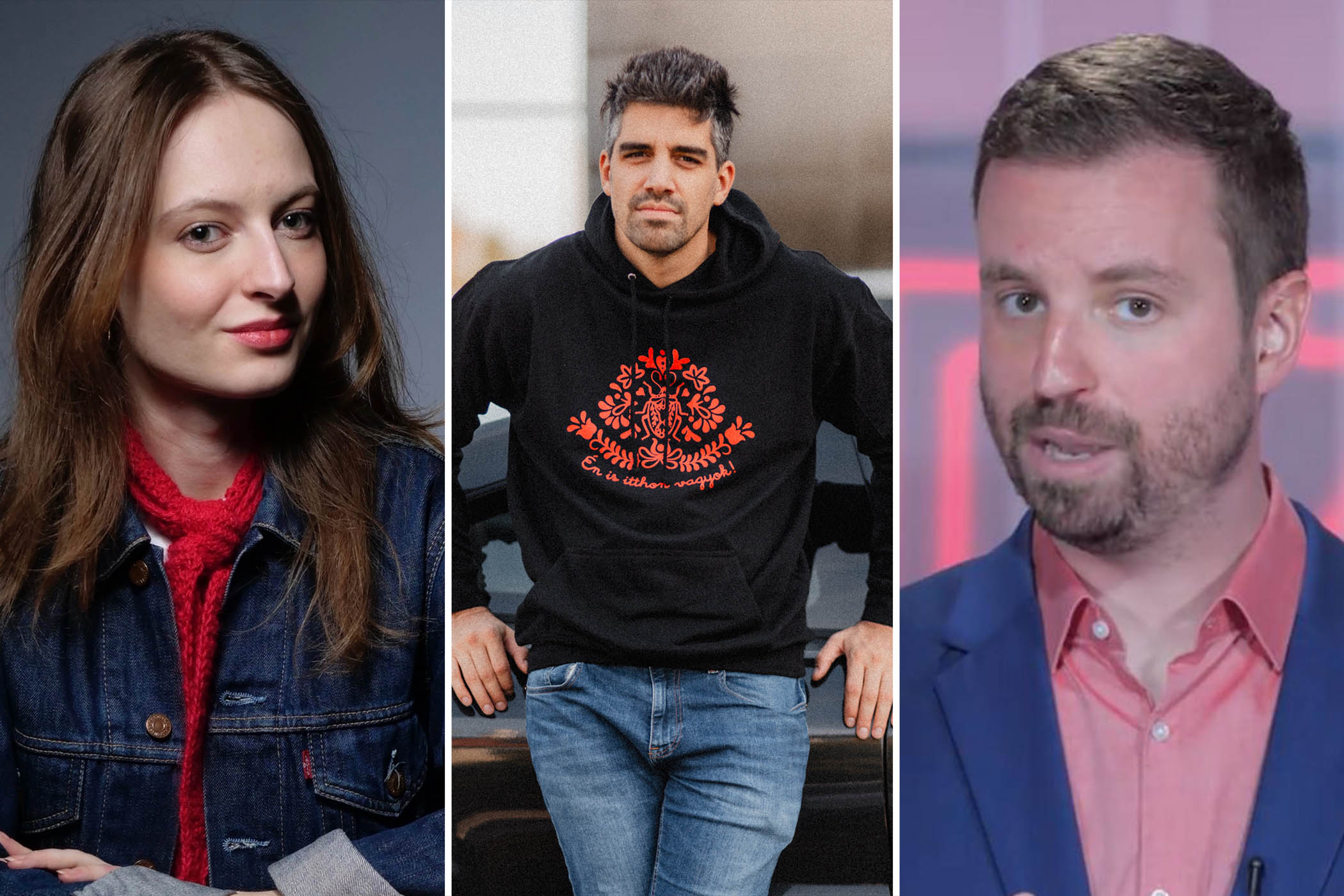“We will be here next week,” Ádám Nagy signs off during a Friday morning stream watched by more than 100,000 people. His co-host then leans into the microphone to say: “The question is: will you be here?”
This farewell has become a trademark of Jólvanezígy (the title means “it’s OK like that”), a daily vlog in which Nagy and his rotating co-hosts discuss current affairs, youth culture and Hungarian politics.
Over the past 15 years, Viktor Orbán’s conservative Fidesz government has destroyed Hungary’s independent media. State TV and radio is controlled by Fidesz appointees, while independent newspapers have been shut down or bought up by Orbán allies and turned into government mouthpieces.
Now they own nearly all radio and TV stations, and local outlets in rural areas. These well-funded outlets largely repeat the rightwing party’s views on migration and the national issues, and operate coordinated smear campaigns against opponents.
In response, YouTube has become a lifeline for independent journalism, with infotainment channels like Jólvanezígy, mixing political news with witty commentary, becoming huge hits. The most popular independent channel, Márton Gulyás’s Partizán, reaches as many people online as TV2, a channel sponsored by state funds.

Nóra Schultz, Ádám Nagy and Márton Gulyás
A charismatic 36-year-old with salt-and-pepper hair, Nagy is far from a newcomer to YouTube. In 2014 he started the channel 6lépés (“six steps”), streaming vox pop interviews with people across the country on topics such as dating, esports and male clothing, amassing 50,000 followers.
In 2022, he launched Jólvanezígy, his daily news-focused channel, in the wake of the pandemic. “There was a clear need to talk about politics in a digestible, sometimes humorous way,” he said.
His show is part of a broader network of independent journalists called Fókusz Stúdió, which employs seven people who host individual YouTube channels. The studio, next to a gas station outside Budapest’s centre, has multiple recording rooms, occupied by various vloggers, podcasters and influencers. Combined, their videos regularly reach at least half a million people, Nagy says, a significant amount in a country with a population of 9.5 million and a unique language.
Years of streaming have won him offline popularity too. Nagy has toured the country in sold-out events with his former Jólvanezígy co-host, comedian Márton Szabó. In February 2024, they joined other influencers in organising a protest against abuse in state care homes, which tens of thousands of people attended.
‘Fidesz is struggling with the fact that in this new media sphere, its members are not popular’
‘Fidesz is struggling with the fact that in this new media sphere, its members are not popular’
Nóra Schultz, podcaster
This has also earned the ire of the government and the party media. “Pressman’s influencer threatens Fidesz with hundreds of millions in his pocket,” one tabloid headline declared. The article now contains a lengthy correction, confirming that contrary to its initial claims, Nagy didn’t commit treason, and didn't get rich from foreign funding. Nagy says reporters from the same outlet also harassed his 90-year-old grandmother.
Newsletters
Choose the newsletters you want to receive
View more
For information about how The Observer protects your data, read our Privacy Policy
In reality, most of Fókusz Stúdió’s income comes from YouTube. Other revenues include paid subscriptions and the sale of merchandise. Sponsors are rare. “A lot of companies and agencies are wary of criticising the government. They prefer not to take risks,” Nagy said.
They once received the equivalent of £11,000 in US funding through a Hungarian NGO’s grant, which they used to buy equipment. This landed them on a list compiled by the state-funded Sovereignty Protection Office, monitoring foreign funding, which alleged they were part of a plot by the US’s Joe Biden administration to illegally influence Hungarian politics.
A new law has been proposed to tighten restrictions. If implemented, media outlets and NGOs receiving funding from outside of the country would face penalties and restrictions on fundraising. “If it is accepted in this current form, it will be a massive blow for the independent media,” Gábor Polyák, from Mérték Media Monitor, says. “We have no tools against it. It’s pure tyranny.”
“Fidesz is really struggling with the fact that in this new media sphere, its members are not popular,” says Nóra Schultz, a political adviser and freelance podcaster at Partizán.
Her podcast, Belépési küszöb (“entry point”), has up to 50,000 listeners every month. Many more read Schultz’s newsletter on Substack, or tune in to her live videos on social media, where she talks about current events and politics.
She believes part of her popularity comes from her honesty – she doesn't hide the fact that she, until recently, worked with a leftwing politician, nor where her alliance is. “If someone is transparent with her worldview, like I am, it is authentic for my listeners,” she said. “And I think it pays off.”
This is what the governing party lacks, she said. “They want to participate in this new media. So they try to build an army of organic-looking influencers.”
This army includes TV presenters, analysts, reporters and politicians with ties to Fidesz, whose social media posts have been lavishly promoted: this September, the Fidesz party and organisations with ties to the government spent more than £2.5m on political ads on social media sites.
Despite the generous spending, organic followership among young generations has not materialised, nor have voters for the ruling party. According to a 2024 poll, only 11% of 18- to 29-year-olds would vote for the ruling party.
“Fidesz tried to do on social media what they did in the mainstream press: get more platforms and spend more,” says Péter Krekó, director of the Budapest-based thinktank Political Capital Institute. “This kind of overly professional messaging doesn’t add to its popularity – it detracts from it.”
Ahead of next April’s election, independent journalists are bracing for more pressure from Fidesz. But back in the studio, Nagy is optimistic. He doesn’t believe the government will interfere with YouTube, their daily news programme, or any of the content creators in their studio. “Ten of Hungary’s top 20 influencers are based here,” Nagy says.
“They can drive us into exile, but I don’t think Hungarians will stay quiet if YouTube is seized or censored,” he said. In this environment, Nagy’s trademark goodbye has become an act of resistance. “As long as people continue watching us, we will continue working.”
Photograph by Ludovic Marin/AFP


